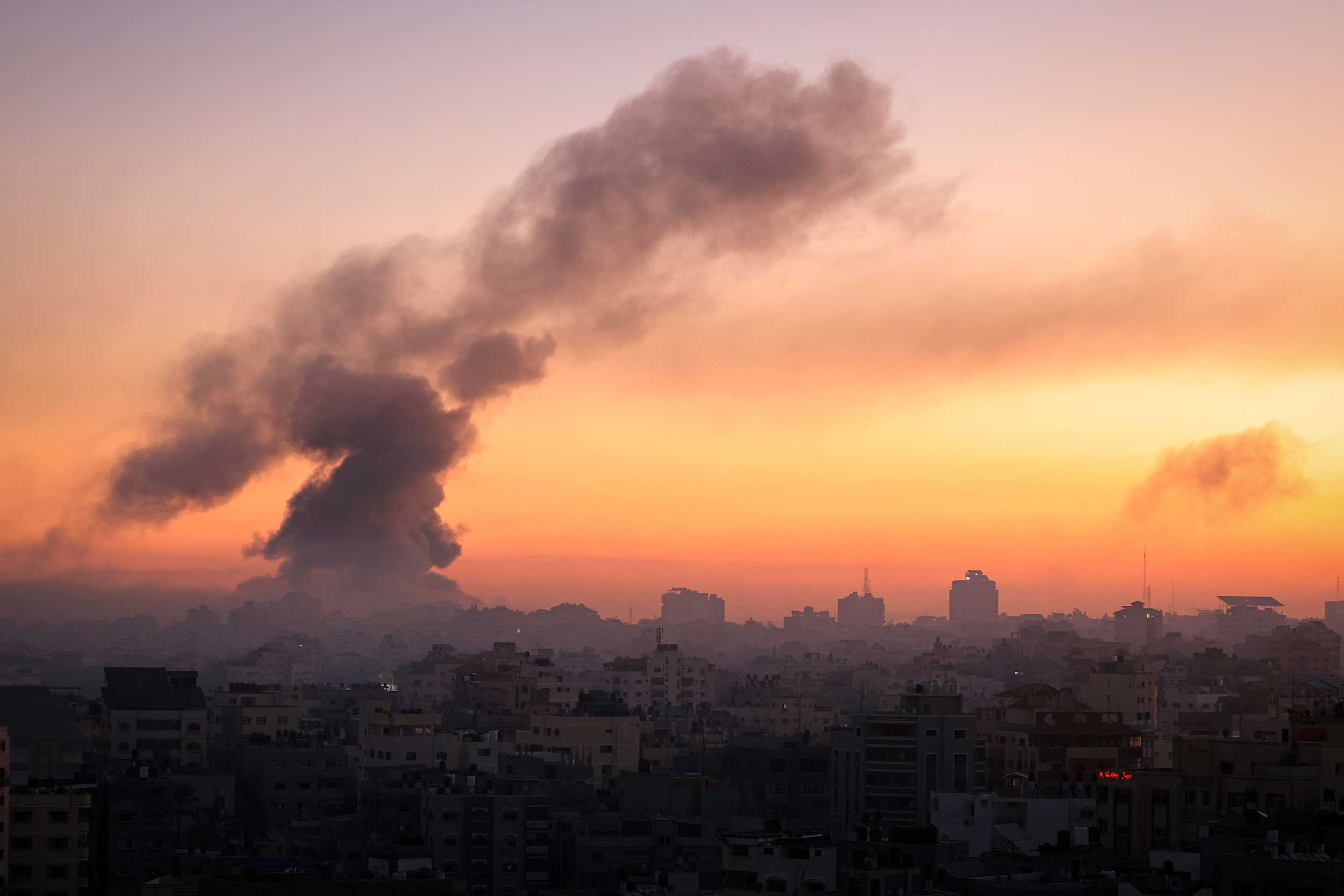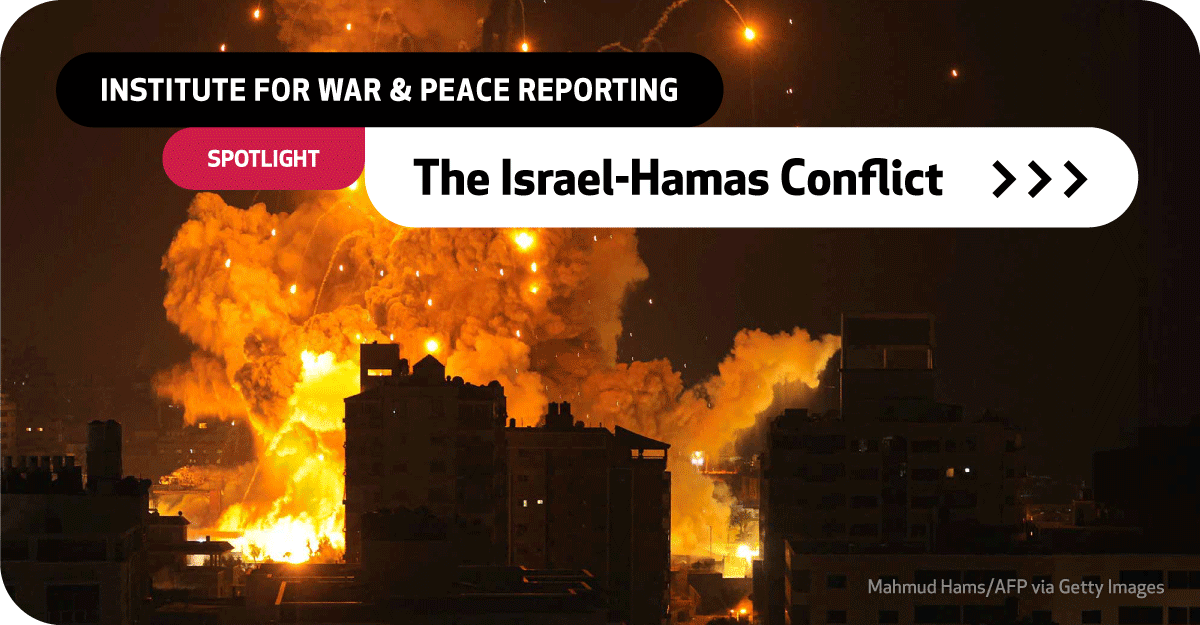Central Asia Fears Israel-Gaza War Could Fuel Radicalisation
There are concerns that Russian disinformation and extremist groups may instrumentalise the conflict.
Central Asian analysts have raised fears that the war between Israel and Hamas might have a ripple effect across the region, fueling a new wave of radicalisation exacerbated by the effect of strident Russian propaganda.
Regional authorities issued a series of calls to stop the violence and resolve the crisis through political and diplomatic means. Kazakstan, the region’s largest country, emphasised the importance of abiding by international law and urged the relevant UN resolutions ensuring legal rights for the Palestinian people to be respected.
While public perception reflects these positions, the tone of discussion is not as composed. Social media is filled with heated debate that risks incites ethnic and religious discord.
“Hamas is considered a movement that wages war against the aggressor.”
“While many Muslims saw the Islamic State in Syria as a radical ideology that deviated from the fundamentals of Islam, Hamas is considered a movement that fights for [Palestinian] independence and self-determination and wages a war against the aggressor,” Asylbek Izbairov, director of Kazakstan’s Institute for Geopolitical Studies, told IWPR.
In Kyrgyzstan, members of parliament decided to donate one day’s salary “as financial help to the Palestinian people suffering from the escalation of the Israeli-Palestinian conflict,” according to a statement.
Well-known Kazak actor and director Nurtas Adambai urged a tour by the Rssian band Mashina Vremeni [Time Machine] be cancelled because of its support for the Israeli army.
RELIGIOUS CONFRONTATION
Muslim identity plays a key role in people’s views of the situation, experts note.
“A lot depends on the conflict escalation, [there] are numerous victims and protests and rallies all over the world. Al-Aqsa mosque is Islam’s third holiest site, the religious context gains strength,” explained Izbairov, referring to the Jerusalem mosque that the Israeli authorities closed on October 24.
Radical Islam emerged in Central Asia after the fall of the Soviet Union. Many Central Asian populations began reclaiming more traditional forms of Islam, partly in reaction to the imposed atheism of the USSR.
Authoritarian regimes, corruption and the repression of any form of dissent resulted in more people turning to radical expressions of the religion, particularly in Tajikistan and Uzbekistan.
“Russian channels create a strongly distorted view of reality.”
Expertd fear that a war in the Middle East could provide extremists with new opportunities to find recruits in Central Asia.
Abdumalik Kodirov, a Tajikistan-based political analyst, argued that feelings of religious solidarity did not encourage efforts to understand the root causes of the crisis.
“Today everyone wants be seen as a ‘defender of Muslims’ by posting a heart-breaking picture of a dead child or woman on their social media profiles,” he told IWPR, adding that people needed to think critically. “Otherwise, we will be taking [the situation] through a prism of a religious confrontation and this is really dangerous.”
Public perception is also influenced by Russian media, which has proved particularly effective in shaping opinion in the wake of the invasion of Ukraine. Russian TV channels dominate the media space across the Central Asian region.
“Most Tajiks absorb these events through Russian television, which does not have a clear state line in condemning or supporting the actions of Israel or Hamas,” Kodirov noted.
However, Russian news programmes are nonetheless filled with footage of apartment buildings in the Gaza Strip crumbling under Israeli airstrikes and suffering Palestinian civilians, with little analysis or context.
“All this encourages media-illiterate people to support the war against Israel and eventually also the actions of Hamas, which is considered as a terrorist organisation in many countries,” Kodirov concluded.
Uzbek political analyst Farkhod Tolipov, who heads the Karavan Zhaniy analytical NGO, also maintained that Russia’s coverage was harmful.
“According to it, there is only one country in the right and all the remaining countries are wrong… in our country, our television keeps on broadcasting Russian channels, which are banned in many other countries, creating a distorted background… and a strongly distorted view of reality. Therefore, we can see public opinion divided on the Palestinian conflict, similar to the situation in Ukraine,” Tolipov said.

ECONOMIC IMPACT
Potential economic disruptions have also added to concerns around the conflict. The Middle East is a key energy supplier and crucial shipping passageway; in the scenario of a spill-over with soaring oil prices and global recession, price fluctuations would have a dire effect on a Central Asia already struggling with the economic impact of Russia’s invasion of Ukraine.
In addition, some experts fear that wealthy countries and blocs like the EU are bound to redirect resources in response to the humanitarian crisis, leaving Central Asian states struggling to receive the financial support they now may rely on.
Kyrgyz political analyst Edil Osmonbetov noted that the war also posed a challenge to the ambitious initiative to build a new trade route from India to Europe through the Middle East.
Announced at the Group of 20 summit held in India in September, the India-Middle East-Europe Economic Corridor (IMEC) is a new avenue connecting railroads and ports from India to Europe, via the UAE, Saudi Arabia, Jordan and Israel.
“It is a direct competitor to the Chinese ‘One Belt One Road’ project,” Osmonbetov said, adding “The corridor’s fate remains unknown as it goes through Israel. There is no direct impact of the delayed implementation on our region, but it is crucial as India could become the geo-economic balance to China in Central Asia in the longer run.”
A reliable link between Saudi Arabia and Israel is a key element of the project, which was announced as Washington’s push for normalisation of relations between the two countries was making headway. The rapprochement now appears indefinitely delayed.
Tolipov argued that Central Asian states must remain neutral amid the renewed violence and simply support the UN resolutions, including the creation of two states.
“The state of Israel was established by the UN and the UN recognises the right of the Palestinian people for their [own] state,” he said. “I think it’s time for Palestine to finally acquire its nationhood and the UN should make clear and explicit statements - firstly, about the creation of the Palestinian state, and, secondly, on the unacceptability of severe actions in the Gaza Strip. So, the two-state solution, as many say nowadays, must form the basis of peace,” he concluded.
In Bishkek, Osmonbetov stressed that the human cost of the conflict should be central to any political stance.
“Civilians, children, old people, women, suffer in any war. No humanitarian disaster should be allowed,” the analyst said, adding, “Civilians should have an option to enter a territory, where they can get medical help, water, food.”

